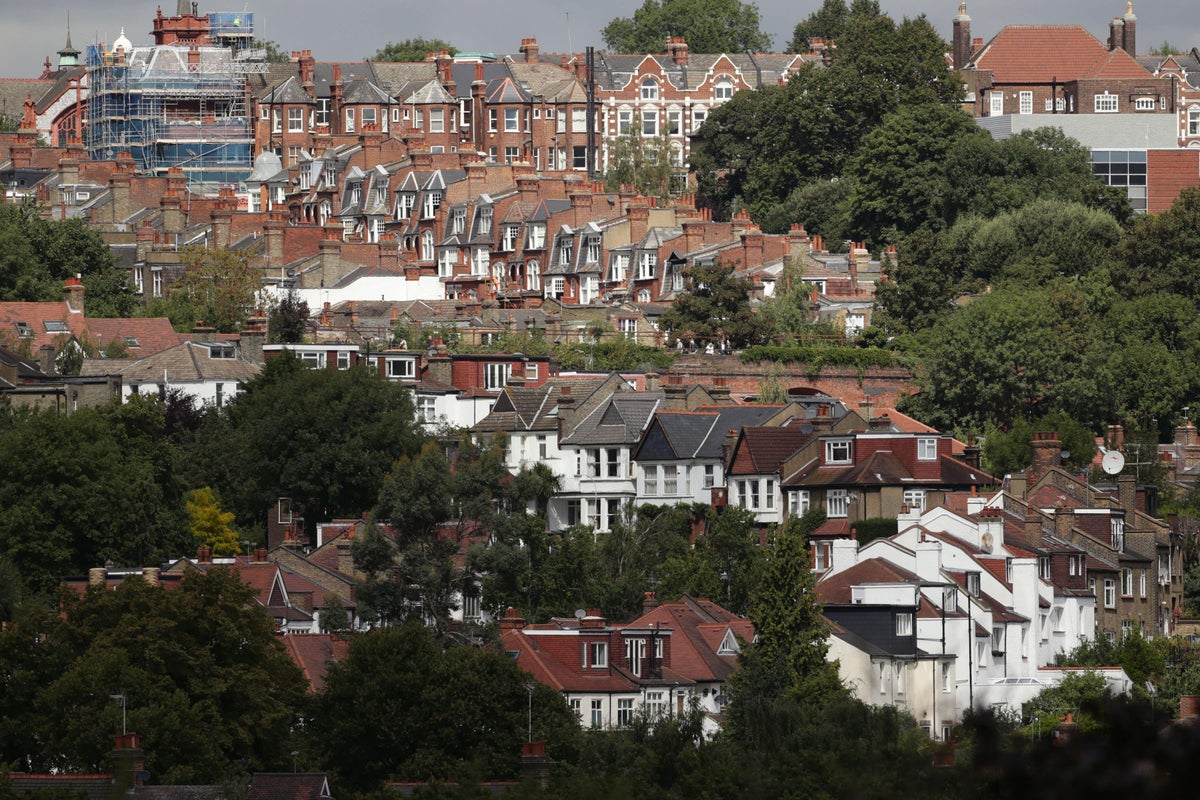
Annual mortgage repayments are set to rise by £2,900 for the average household remortgaging next year, according to a think-tank.
As the UK’s “mortgage crunch” deepens, total annual mortgage repayments could rise by £15.8 billion by 2026, the Resolution Foundation said.
Stickier-than-expected inflation has raised expectations that the Bank of England’s base rate-rising cycle, which started in December 2021, will continue for longer.
Rates are now expected to peak, in mid-2024, at nearly 6%, the foundation said.
Those higher expectations are swiftly moving through into mortgage rates, with deals being withdrawn from the market and replaced by new ones with higher rates.
The mortgage crunch is now on track to increase mortgage bills by £15.8 billion— Simon Pittaway, Resolution Foundation
Data released by Moneyfactscompare.co.uk on Friday indicated that the average two-year fixed-rate homeowner mortgage was teetering just below the 6% mark, at 5.98%.
The Resolution Foundation said it is expected that the average two-year fixed-rate mortgage will not fall below 4.5% until the end of 2027.
This would significantly increase the scale of the mortgage crunch currently unfolding, it said.
Annual repayments are now on track to be £15.8 billion a year higher by 2026 compared with prior to the Bank’s rate-tightening cycle starting in December 2021, up from a projected £12 billion increase at the time of the most recent Monetary Policy Report in early May, the foundation said.
Around three-fifths of this increase in annual mortgage payments is yet to be passed on to households, as borrowers move off existing fixed-rate mortgage deals on to new fixed-rates, up to 2026, the report added.
This is expected to deliver a rolling living standards hit to millions of households in the run-in to the next general election.
This year’s rate rises are also predicted by the foundation to increase the cost of a typical mortgage by 3% of typical household income this year – even bigger than a 2.4% increase seen in 1989.
The foundation, which focuses on improving living standards for those on low to middle incomes, said that the better news for the Government, however, is that the current mortgage crunch is less widespread than previous shocks.
Back in 1989, nearly 40% of households owned a home with a mortgage, and were therefore exposed to rising costs.
By last year, the combination of more older people owning outright, and fewer young people owning at all, meant that the share of households with a mortgage had fallen below 30%.
Overall, around 7.5 million households with a mortgage are expected to see their repayments rise by 2026, the report said.
Simon Pittaway, senior economist at the Resolution Foundation, said: “Market expectations that interest rates are going to rise even higher, and stay higher for longer, are having a major effect on the mortgage market, with deals being pulled and replaced with new higher-rate mortgages.
“This means the mortgage crunch is now on track to increase mortgage bills by £15.8 billion, with those remortgaging next year set to see their costs rise by £2,900 on average.
“Of course, market expectations can be wrong, and rate rises may not turn out to be as bad as feared.
“But with three-fifths of Britain’s £15.8 billion mortgage hike still to be passed on to households, rising repayments will deal an ongoing living standards blow to millions of households in the run-in to the general election.”
A Treasury spokesperson said: “We know this is a concerning time for mortgage holders, which is why the FCA (Financial Conduct Authority) requires lenders to offer tailored support to borrowers struggling to make their payments, and we continue to support mortgage holders through the Support for Mortgage Interest scheme.
“Behind this though is global inflation, continuing to eat away at incomes around the world, which is why the single biggest thing we can do to help families is to halve the rate this year.
“We are also supportive of the Bank of England in their independent decisions on interest rates, and continue to provide around £3,300 per household this year and next to help with rising costs.”







